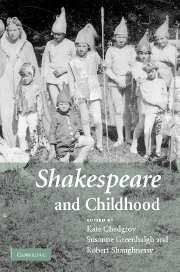Book contents
- Frontmatter
- Contents
- Acknowledgements
- Notes on contributors
- Note on the text
- 1 Introduction
- PART 1 SHAKESPEARE'S CHILDREN
- PART 2 CHILDREN'S SHAKESPEARES
- 8 Introduction: reinventing Shakespearean childhoods
- 9 Play's the thing: agency in children's Shakespeares
- 10 Shakespeare in the Victorian children's periodicals
- 11 Growing up with Shakespeare: the Terry family memoirs
- 12 Shakespeare in the company of boys
- 13 Dream children: staging and screening childhood in A Midsummer Night's Dream
- 14 Shakespeare (')tween media and markets in the 1990s and beyond
- APPENDICES
- Index
11 - Growing up with Shakespeare: the Terry family memoirs
Published online by Cambridge University Press: 22 September 2009
- Frontmatter
- Contents
- Acknowledgements
- Notes on contributors
- Note on the text
- 1 Introduction
- PART 1 SHAKESPEARE'S CHILDREN
- PART 2 CHILDREN'S SHAKESPEARES
- 8 Introduction: reinventing Shakespearean childhoods
- 9 Play's the thing: agency in children's Shakespeares
- 10 Shakespeare in the Victorian children's periodicals
- 11 Growing up with Shakespeare: the Terry family memoirs
- 12 Shakespeare in the company of boys
- 13 Dream children: staging and screening childhood in A Midsummer Night's Dream
- 14 Shakespeare (')tween media and markets in the 1990s and beyond
- APPENDICES
- Index
Summary
‘REMEMBER ME’: THE TERRY/CRAIG MEMOIRS
Ellen Terry was described in 1898 as ‘the actress who in our time is most intimately associated with the impersonation of Shakespeare's Heroines’. Her son Edward Gordon Craig is remembered for his avant-garde stage designs, his theory of the Übermarionette and his production of Hamlet for Stanislavsky at the Art Theatre in Moscow in 1912. Both are the authors of unusually vivid theatrical memoirs, which give us an insight into Shakespeare's role in shaping the narratives of the nineteenth-century childhood and adolescence of these theatre practitioners. Shakespeare, in these texts, is more than merely the creator of characters the playing of whom constitutes the pinnacle of an actor's career. His works can be seen to influence the way in which personal experience is conceptualized and the experience of growing up is understood.
Terry's 1908 The Story of My Life, written with the assistance of her daughter's partner Christopher St John (aka Christabel Marshall), has for many years been recognized as one of the few actors' memoirs to have genuine literary merit. It forms the basis of and is reinterpreted by Gordon Craig in Ellen Terry and Her Secret Self (1931) and Index to the Story of My Days (1957). While the first of Gordon Craig's books is ostensibly a biography of his mother which, with polemic heaviness, turns out to a large extent to focus on himself, the second is a quirky, highly selective autobiography which focuses to just as large an extent on his mother.
- Type
- Chapter
- Information
- Shakespeare and Childhood , pp. 169 - 183Publisher: Cambridge University PressPrint publication year: 2007
- 1
- Cited by

